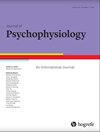Psychophysiological Stress Response of Novel Students in Chemical Laboratory Practices
IF 0.9
4区 心理学
Q4 NEUROSCIENCES
引用次数: 0
Abstract
Abstract. The aim of the present study was to analyze the psychophysiological stress response of novel pharmacy and biotechnology students in chemistry laboratory practices. Autonomic stress response was analyzed in 66 students by considering heart rate variability (HRV) values before, during, and after their first laboratory practice, as well as their distress perception before and after this activity. In the laboratory practice, students had to deal with toxic products, sharp objects, or irritating substances while being examined by the teachers. Consistent with a large anticipatory anxiety response at the beginning of the practice, results showed low HRV values, generally related to a typical sympathetic modulation. This sympathetic effect persisted during the entire laboratory practice. Moreover, just after the end of the practice, there was an attenuation of the sympathetic activation and a takeover by the parasympathetic system, as revealed by the increase of HRV parameters. Laboratory practices performed by novel Pharmacy and Biotechnology students did not produce the expected habituation response at psychophysiological level since, in addition to an anticipatory anxiety response observed prior to the laboratory practice, a high sympathetic autonomic activation was observed during the whole practice. In brief, using HRV parameters could be a useful tool to analyze stress responses in students and to help them with new strategies to improve routine evaluation procedures.新生在化学实验室实习中的心理生理应激反应
摘要本研究的目的是分析新药学和生物技术专业学生在化学实验室实践中的心理生理应激反应。通过考虑第一次实验室练习之前、期间和之后的心率变异性(HRV)值,以及他们在该活动前后的痛苦感知,对66名学生的自主应激反应进行了分析。在实验室实践中,学生在接受老师检查时必须处理有毒产品、尖锐物体或刺激性物质。与实践开始时的大量预期焦虑反应一致,结果显示HRV值较低,通常与典型的交感神经调节有关。这种同情效应在整个实验室实践中一直存在。此外,就在练习结束后,交感神经激活减弱,副交感神经系统接管,HRV参数的增加表明了这一点。新药学和生物技术专业学生进行的实验室实践没有在心理生理水平上产生预期的习惯反应,因为除了在实验室实践前观察到的预期焦虑反应外,在整个实践过程中还观察到高度的交感自主激活。简言之,使用HRV参数可以成为分析学生压力反应的有用工具,并帮助他们制定新的策略来改进日常评估程序。
本文章由计算机程序翻译,如有差异,请以英文原文为准。
求助全文
约1分钟内获得全文
求助全文
来源期刊

Journal of Psychophysiology
医学-神经科学
CiteScore
2.60
自引率
7.70%
发文量
25
审稿时长
>12 weeks
期刊介绍:
The Journal of Psychophysiology is an international periodical that presents original research in all fields employing psychophysiological measures on human subjects. Contributions are published from psychology, physiology, clinical psychology, psychiatry, neurosciences, and pharmacology. Communications on new psychophysiological methods are presented as well. Space is also allocated for letters to the editor and book reviews. Occasional special issues are devoted to important current issues in psychophysiology.
 求助内容:
求助内容: 应助结果提醒方式:
应助结果提醒方式:


